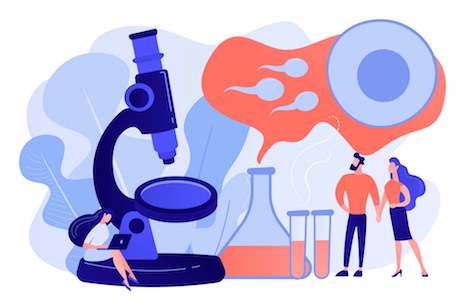By Dr. Brandon Colby MD, an expert in genetic testing and personalized medicine.
Genetic disorders are diseases with different types of birth defects, developmental disabilities, sensory deficits, and chronic diseases that are passed down from generation to generation.
Types of Birth Defects
A birth defect is a condition or physical abnormality that is present at birth. The following are types of birth defects:
- Cataracts
- Cleft Lip or Palate
- Congenital Heart Disease
- Contractures
- Diaphragmatic Hernia
- Genital Malformations
- Glaucoma
- Misshapen Skull
- Missing Fingers or Toes
- Missing or Incomplete Arms or Legs
- Spina Bifida
- Open Spine Defects
Genetic Chronic Diseases
Chronic diseases are those that are either untreatable or highly resistant to treatment. The following are ones that can be inherited from a parent:
- Bleeding Disorders
- Childhood Cancers
- Kidney or Urinary Tract Disease
- Slow Growth or Short Stature
- Cystic Fibrosis
- Sickle Cell Disease
- Thalassemia
Developmental Disabilities
Many developmental disabilities are genetic. Knowing which developmental delays are hereditary can help parents seek help as soon as symptoms present.
- Autism
- Attention-Deficit/Hyperactivity
- Development Delay
- Failure to Thrive
- Learning Disability
- Loss of Developmental Skills
- Low Muscle Tone
- Mental Illness
- Mental Retardation
- Speech Problems
- Seizures
Development disabilities, while not life-threatening, can severely impact the quality of a child's life and carry on through adulthood. Early detection can mitigate the symptoms and lead to more positive outcomes.
Sensory Problems
Sensory problems or deficits can be present at birth or develop over the course of childhood as a parent notices issues arise. Examples of sensory deficits include:
- Extreme Farsightedness
- Extreme Nearsightedness
- Hearing Loss
- Vision Problems
Other Genetic Disorders in Children

There are many other genetic diseases parents should know about, so they can keep an eye out for them during early development.
Down Syndrome
Down syndrome or Trisomy 21 occurs because the child inherits an extra chromosome. This genetic condition is marked by a set of cognitive and physical symptoms, including mild to moderate intellectual disability. Many children with down syndrome also suffer from a heart defect. Prenatal genetic testing for Down syndrome can identify signs a baby will be born with the condition, so that proper healthcare efforts can be implemented.
Tay-Sachs Disease
This is a rare disease that destroys nerve cells in the brain and spinal cord. The most common form of this disease presents in infancy. Parents notice something is wrong when development slows and muscles begin to weaken making movement difficult. Other forms of Tay-Sachs diseases can appear some time in later childhood, adolescence, or adulthood. These symptoms are much milder than forms that develop in infancy.
Marfan Syndrome
This genetic disorder in children affects connective tissue - fibers that support and anchor the organs and other structures of the body. The most affected parts of the body are the heart, eyes, blood vessels and skeleton. Those affected by this genetic disorder are usually very tall with disproportionate arms, legs, and fingers. The condition can become life-threatening when it starts to affect the heart.
Sickle Cell Anemia
Sickle cell anemia or sickle cell disease is an inherited red blood cell disorder. Those with this disease do not have enough healthy red blood cells to carry oxygen through the body. Parents often notice something wrong with their baby at 5 months of age. Symptoms include, but are not limited to:
- Anemia
- Pain
- Hand and Feet Swelling
- Frequent Infections
- Developmental Delays
- Vision Problems
Turner Syndrome
Turner syndrome is a chromosomal disorder that affects female development. Short stature is the most common symptom and presents at about the age of five years old. Loss of ovarian function happens early and most girls with this disorder never go through puberty. Hormone therapy can help, but most girls are never able to conceive.
Phenylketonuria (PKU)
This is a rare inherited disorder that causes the amino acid phenylalanine to build up in the body. PKU happens because of a gene defect that is responsible for the enzyme that breaks down phenylalanine. Those with this disorder must limit their intake of PKU, which is found in protein-based foods. Babies often show signs of this disorder in the first few months of life.
What to Remember about Genetic Disorders in Children

Pregnant women and those thinking of conceiving may read the above and immediately become nervous. This is normal but unnecessary. Many of the above genetic disorders in children are rare. Only 6% of babies are born with a genetic disease worldwide in a year.
While it is good to know about the risks of health problems for your baby, the knowledge shouldn't affect your mental health. This could in turn cause undue stress while pregnant.
One of the best ways to reduce the stress of knowing about the many genetic disorders in children is to seek genetic testing.
Genetic Testing for Inherited Disorders in Children
Genomic research has come a long way over the years. Geneticists have been able to identify genes responsible for many genetic disorders in children. While a blood test during prenatal screening can show possible chromosomal abnormalities, there's also genetic testing with whole-genome sequencing.
Testing the entire human genome and analyzing it for gene mutations that could lead to genetic disorders in children could shed light on the risks parents may be passing on to their children.
For instance, x-linked recessive diseases most often occur in males. Males only have one X chromosome and a single recessive gene on that X chromosome can cause the disease. Diseases such as hemophilia and Duchenne muscular dystrophy occur on the X chromosome. If the mother is a carrier of disease because she only had one abnormal X chromosome, the mother has a 25% chance of having a boy with a disease. Knowing if the mother is a carrier is important in knowing how likely a baby boy will develop a disease.
While many people only seek genetic testing when they have a family history of genetic diseases, everyone should consider having it done. Genetic counselors highly recommend it since it can lead to a greater need for prenatal screening and diagnostic testing once a baby is born.
Early detection is highly important in the treatment of many genetic disorders in children. A single gene could lead to a disability or life-threatening condition, so knowing if either parent is a carrier can save a life.
One of the most common questions people ask online is when the best time is to seek genetic testing. The answer is... ANY time. Genetic testing for babies can be done before pregnancy (preconception), and genetic testing during pregnancy is also a good time. After pregnancy, genetic testing on babies can be performed. Keep reading below why our testing kit is perfect for genetic testing at any time, even shortly after birth.
Ultimate Genome Sequencing
Healthcare professionals as well as millions of people around the world use genome sequencing to learn about their risks of developing a genetic disease or passing it on to their children. Sequencing.com's Ultimate Genome Sequencing is an easy-to-use service that is available to people seeking genetic testing in the comfort of their home.
An Ultimate Genome Sequencing kit includes everything needed to obtain a DNA sample via a cheek swab. The DNA sample is then sent to the lab for testing and results are uploaded to the secure and confidential database on Sequencing.com for use with any of the apps in the App Market. This includes apps that can analyze the raw DNA data file for genetic diseases.
The Ultimate Genome Sequencing cheek swab can be performed early in life. Genetic testing for babies has never been easier. Learn more about that in How Soon Can You DNA Test a Baby After Birth.
In addition to apps that analyze DNA data for genetic disorders, there are also COVID-related apps. These will analyze DNA for coronavirus susceptibility risk as well as severity. Learn more about these apps in My DNA and COVID-19: What's My Risk?
About The Author
Dr. Brandon Colby MD is a US physician specializing in the personalized prevention of disease through the use of genomic technologies. He's an expert in genetic testing, genetic analysis, and precision medicine. Dr. Colby is also the Founder of Sequencing.com and the author of Outsmart Your Genes.
Dr. Colby holds an MD from the Mount Sinai School of Medicine, an MBA from Stanford University's Graduate School of Business, and a degree in Genetics with Honors from the University of Michigan. He is an Affiliate Specialist of the American College of Medical Genetics and Genomics (ACMG), an Associate of the American College of Preventive Medicine (ACPM), and a member of the National Society of Genetic Counselors (NSGC).
